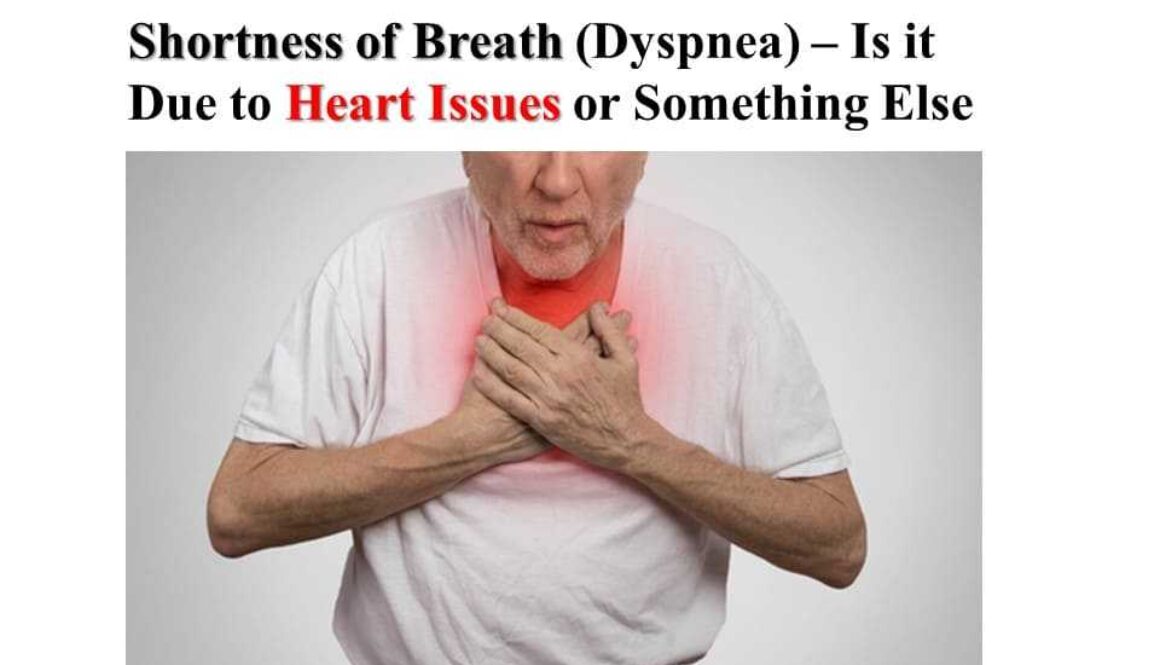Shortness of Breath (Dyspnea) – Is it Due to Heart Issues or Something Else?
Shortness of breath (Dyspnea) – Is it Due to Heart Issues or Something Else – How to Know?
Shortness of breath causes
Prior to knowing shortness of breath causes, let us try to find answers for the following few questions:
Is your breathing difficulty something like uncomfortable breathing; difficult breathing or just a feeling that you are unable to get enough air?
The next question is…
Does your breathing difficult always indicate a medical problem?
Some individuals don’t have any medical condition yet they feel breathlessness only with a mild exercise – climbing stairs or walking on elevated surfaces or by doing mild exercises. Some people have advanced lung disease and don’t feel breathlessness. How to detect your shortness of breath causes then?
Nasal congestion, asthma and obesity can also cause shortness of breath, but sometimes it can indicate heart problems as well. How to distinguish the cause?
What are the other causes of shortness of breath?
- Pulmonary Embolism
- Anaemia
- Lung Cancer
- Pneumonia
- Bronchitis
- COPD
- Anxiety
- Lower oxygen levels
- Interstitial lung disease
- Pulmonary fibrosis
- Emphysema
- Pulmonary artery hypertension
- Obesity Tuberculosis
- Carbon monoxide poisoning
- Sarcoidosis
- Rib fracture
- Epiglottitis
- Allergic reaction (anaphylaxis)
- Guillain-Barré syndrome
Shortness of breath and heart disease
Many people know that chest pain is the major symptom of heart disease, but the shortness of breath is not well known as another major symptom of heart disease.
Shortness of breath and heart disease facts
- People with shortness of breath as the symptom of heart attack are at an increased risk of dying than patients with typical chest pain. (four times more likely to suffer death).
- The risk is high because those who experience it do not interpret it as a serious symptom of heart disease or heart attack.
- In patients who have cardiac risk factors without any known lung disease, breathlessness may indicate a serious CAD (coronary artery disease).
Shortness of breath can indicate heart failure
Heart failure or congestive heart failure doesn’t mean that your heart has stopped functioning or heart beating has stopped. Rather it means the heart has become weak. Which means, your heart is no longer stronger enough to pump blood efficiently. When this happens, you will feel weak, tired and shortness of breath. The other symptoms of heart failure include swelling in feet, legs and ankles.
In the initial stages of the condition, you may start to feel breathlessness or breathing difficulty after walking a certain distance, then walking across and roaming in your home. As the condition progresses, you may find breathing difficulty getting worse and you will feel it more during getting dressed up and even when you lie down. When this happens, you must consult your cardiologist.
Shortness of breath causes: Coronary Artery Disease (CAD)
Coronary artery disease (CAD) symptoms manifest gradually. When the blood flow to the heart decreases, it may cause shortness of breath, angina (chest pain), weakness and other signs and symptoms of coronary artery disease. Undetected and untreated CAD can lead to a heart attack.
Shortness of breath is a sign of heart attack
Shortness of breath in association with unusual fatigue is a warning sign of heart disease (heart attack) both in men and women. However, women tend to have this problem more often than men. Some women report that they would get unusually short of breath and tired for the activity they were performing. This could indicate a potential symptom of a heart attack in women.
Shortness of breath can indicate Tachycardia
Shortness of breath causes: When your heart beats faster than usual maybe for up to more than 90 beats per minute or more, this is considered as fast heart rate or tachycardia. Many types of tachycardia are there, but the one that can cause breathing difficulty or shortness of breath is atrial tachycardia. If you have shortness of breath and faster heart rate or heartbeats, you must seek medical help immediately. Read more about Abnormal heartbeats
Cardiomyopathy can cause shortness of breath
Cardiomyopathy is a condition in which your heart muscles become weak and damaged. In this condition, your heart’s efficiency gradually comes down and thus it becomes hard for the heart to pump blood to the body. Cardiomyopathy can happen due to many reasons – such as diabetes, heart attack, infections or cancer treatment. In some cases, the causes of cardiomyopathy are unknown. The risk factors for cardiomyopathy may include smoking, excessive alcohol consumption and high blood pressure.
Bottom line
Always take breathing problems seriously or else your life would be at stake
Whether you know shortness of breath causes or not whenever you feel that you have a breathing problem, consult a specialist doctor to know the underlying cause. Explain to the doctor every single detail pertaining to your problem. Tell the doctor when you are feeling the problem; how frequently you have it and what other symptoms are associated with it and since how long have you been experiencing the problem.
Why is it important to consult a doctor?
A cardiologist will examine you completely; take your complete medical history into consideration – including your current health issues, other symptoms and risk factors. The doctor will try to classify dyspnea as either occurring at rest or associated with any activity – exercise, exertion or any other activity. Furthermore, the cardiologist will try to understand whether shortness of breath is sudden or occur gradually. In this way, the doctor will take every possible aspect into consideration before precisely diagnosing shortness of breath causes.
Always think about your heart even if you think that you would not get a heart attack. This is important because don’t hesitate to be wrong rather than not getting medical help. Don’t forget that your heart matters a lot.

